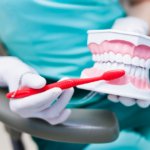 Students, parents, professionals…everyone gets stressed out at some point or another. Most of us know that stress has an overall negative impact on our health, but have you ever thought about what stress does to your teeth?
Students, parents, professionals…everyone gets stressed out at some point or another. Most of us know that stress has an overall negative impact on our health, but have you ever thought about what stress does to your teeth?
Hint: it’s not good.
Today, the Perio NYC team is here to talk about the effects that stress has on your dental health and how to mitigate the damage it causes.
Bruxism and Stress
Bruxism is the technical term for teeth grinding and it can be easily linked with stress in many cases. A lot of patients with excess stress or anxiety disorders unconsciously grind their teeth during sleep, and this can cause serious damage to the jaw or teeth. In some cases, bruxism can even cause teeth to loosen, fracture, or fall out.
Because a lot of people aren’t aware that they’re chronic teeth-grinders, it’s important to be aware of the symptoms. Watch out for:
- Headaches
- Worn down enamel
- Fractured or chipped teeth
- Pain in the jaw or face
- Increased tooth sensitivity
If one or more of these symptoms applies to you, contact your dental professional. You may be suffering from a case of stress-induced bruxism. A mouthguard may be the best option for you.
Temporomandibular Joint Disorder and Stress
The temporomandibular joint (TMJ) is the joint that connects the jaw to the skull. Sometimes, a number of behaviors or physiological changes affect the way that the joint functions, causing Temporomandibular Joint Disorder, or TMD.
Stress can be a huge factor in cases of TMD. When stressed-out patients clench their jaws or grind their teeth as described above, excess stress and pressure are placed on the joint, resulting in headaches, jaw pain, and oftentimes, misalignment of the bite. Other times, patients find that the tips and surfaces of their teeth begin to dull over time, damaging the enamel irreparably.
If you suspect that you have TMD, give our dentist a call right away to prevent any lasting effects from compromising your oral health.
Xerostomia and Stress
Xerostomia is a fancy word for dry mouth. Whether you forget your bottle of water on your jog or you find that you’re having a hard time speaking when you get nervous, you’ve probably experienced a little bit of dry mouth from time to time.
Anxiety is linked to dry mouth for a number of reasons:
- Mouth breathing – People tend to take bigger, deeper breaths through their mouths when experiencing a bout of heightened anxiety.
- Acid reflux – Some patients with anxiety also have acid reflux, which affects the salivary glands. The salivary glands will produce less saliva and therefore lead to dry mouth.
- Fluid changes – When the fight or flight system in your body is activated during an anxiety attack, the fluids in your body change, oftentimes leaving the mouth dry.
While dry mouth may not seem like a big deal, the effects can be devastating to your dental health. Saliva plays a critical role in keeping your mouth clean and free of excess sugar and food particles.
When you don’t have enough saliva to wash away the remnants of your last meal, the bacteria that lives in your mouth has an all-you-can-eat feast. That bacteria produces an acid waste—plaque. Plaque attacks your enamel, which will erode and can eventually cause decay.
The best thing that you can do to prevent stress-induced dry mouth is to carry water with you at all times. Keeping hydrated can ensure that your mouth stays clean while also reducing anxiety in some cases. Additionally, speak to your mental health professional. There are many behavioral therapies and medications available that have proven to greatly help patients with anxiety.
Contact Us
Talk to your health care providers if you go through periods of prolonged stress or anxiety. Stress can cause considerable damage to your health and put a damper on your life. Start by calling your NYC dentist to keep your oral health protected. We’re dedicated to helping all of our patients maintain a healthy smile.


